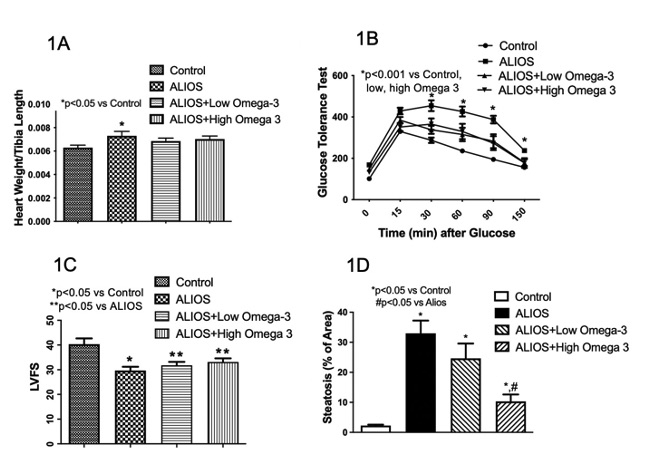Tuesday Poster Session
Category: Liver
P4580 - Omega-3 Polyunsaturated Fatty Acids Ameliorate Diet-Induced Hepatic Steatosis and Cardiomyopathy in Mice
Tuesday, October 29, 2024
10:30 AM - 4:00 PM ET
Location: Exhibit Hall E

Has Audio

Alam Merchant, MD
Emory University School of Medicine
Atlanta, GA
Presenting Author(s)
Alam Merchant, MD1, Sanjay Chandrasekhar, MD1, Lihong Cheng, PhD1, Dan Sorescu, MD2
1Emory University School of Medicine, Atlanta, GA; 2Emory University, Atlanta, GA
Introduction: Cardiometabolic syndrome associated with obesity and fatty liver has strong roots in the western-type diet that is rich in trans-fat, polyunsaturated fat, saturated fat and fructose. Exposure to the ALIOS (American lifestyle-induced obesity syndrome) diet recapitulates many of the classic findings of metabolic syndrome in mice. Our study aimed to evaluate if omega-3 fatty acid supplementation reverses cardio-metabolic syndrome and fatty liver caused by ALIOS diet.
Methods: 4-week-old male C57BL/6J mice were fed either standard chow or a high fat diet containing trans-fat (30%) and high-fructose corn syrup (2%) (ALIOS diet) or ALIOS diet with low dose 0.77% omega-3 (equivalent to 2 grams fish oil supplement daily) or ALIOS diet with high dose 1.54% (equivalent to 4 grams fish oil supplement daily) and were sacrificed after 16 weeks. For each group, echocardiography and glucose tolerance testing were obtained. Cardiac size and functioning were measured by the ratio of heart weight to tibia length and echocardiographic fractional shortening (FS) respectively. Liver fat was quantified via oil red O or Red Sudan staining. Data analysis was performed using one or two-way ANOVA using GraphPad Prism10.
Results: At 16 weeks, ALIOS mice had significantly higher visceral fat normalized to tibia length (0.062±0.001) when compared to control mice (0.016 ± 0.001, p< 0.05) and significantly worse glucose tolerance (1B) (n=6, p< 0.05). Concomitant supplementation with low dose or high dose omega-3 partially reversed impaired glucose tolerance in mice fed with ALIOS diet at 14 weeks. Mice exposed to ALIOS diet developed cardiac hypertrophy at 16 weeks (p< 0.05) (1A) but also upregulation of fat content in livers (1D) when compared to control diet (2.3±0.27% control versus 33±4.2% ALIOS, n=6, p< 0.05). Progressive cardiac dysfunction (1C) was observed at 16 weeks of ALIOS diet (Control vs ALIOS FS 40.3% vs 29.3%, n=6, p< 0.05) which was partially reversed by concomitant supplementation with omega-3: ALIOS (FS 29.3%) vs omega-3 low dose (FS 31.8%) vs omega-3 high dose (FS 33.8%), n=6, p< 0.05. This coincided with dramatic improvement of steatosis in livers of mice in which ALIOS diet was supplemented with omega-3 (ALIOS 33±4.2% versus ALIOS + omega-3 low dose 24.65±4.94% versus ALIOS+ omega-3 high dose 10.33±2.27%), (1D).
Discussion: Supplementation with omega-3 fatty acids reverses cardiometabolic syndrome by preventing fatty liver induced by an ALIOS diet.

Disclosures:
Alam Merchant, MD1, Sanjay Chandrasekhar, MD1, Lihong Cheng, PhD1, Dan Sorescu, MD2. P4580 - Omega-3 Polyunsaturated Fatty Acids Ameliorate Diet-Induced Hepatic Steatosis and Cardiomyopathy in Mice, ACG 2024 Annual Scientific Meeting Abstracts. Philadelphia, PA: American College of Gastroenterology.
1Emory University School of Medicine, Atlanta, GA; 2Emory University, Atlanta, GA
Introduction: Cardiometabolic syndrome associated with obesity and fatty liver has strong roots in the western-type diet that is rich in trans-fat, polyunsaturated fat, saturated fat and fructose. Exposure to the ALIOS (American lifestyle-induced obesity syndrome) diet recapitulates many of the classic findings of metabolic syndrome in mice. Our study aimed to evaluate if omega-3 fatty acid supplementation reverses cardio-metabolic syndrome and fatty liver caused by ALIOS diet.
Methods: 4-week-old male C57BL/6J mice were fed either standard chow or a high fat diet containing trans-fat (30%) and high-fructose corn syrup (2%) (ALIOS diet) or ALIOS diet with low dose 0.77% omega-3 (equivalent to 2 grams fish oil supplement daily) or ALIOS diet with high dose 1.54% (equivalent to 4 grams fish oil supplement daily) and were sacrificed after 16 weeks. For each group, echocardiography and glucose tolerance testing were obtained. Cardiac size and functioning were measured by the ratio of heart weight to tibia length and echocardiographic fractional shortening (FS) respectively. Liver fat was quantified via oil red O or Red Sudan staining. Data analysis was performed using one or two-way ANOVA using GraphPad Prism10.
Results: At 16 weeks, ALIOS mice had significantly higher visceral fat normalized to tibia length (0.062±0.001) when compared to control mice (0.016 ± 0.001, p< 0.05) and significantly worse glucose tolerance (1B) (n=6, p< 0.05). Concomitant supplementation with low dose or high dose omega-3 partially reversed impaired glucose tolerance in mice fed with ALIOS diet at 14 weeks. Mice exposed to ALIOS diet developed cardiac hypertrophy at 16 weeks (p< 0.05) (1A) but also upregulation of fat content in livers (1D) when compared to control diet (2.3±0.27% control versus 33±4.2% ALIOS, n=6, p< 0.05). Progressive cardiac dysfunction (1C) was observed at 16 weeks of ALIOS diet (Control vs ALIOS FS 40.3% vs 29.3%, n=6, p< 0.05) which was partially reversed by concomitant supplementation with omega-3: ALIOS (FS 29.3%) vs omega-3 low dose (FS 31.8%) vs omega-3 high dose (FS 33.8%), n=6, p< 0.05. This coincided with dramatic improvement of steatosis in livers of mice in which ALIOS diet was supplemented with omega-3 (ALIOS 33±4.2% versus ALIOS + omega-3 low dose 24.65±4.94% versus ALIOS+ omega-3 high dose 10.33±2.27%), (1D).
Discussion: Supplementation with omega-3 fatty acids reverses cardiometabolic syndrome by preventing fatty liver induced by an ALIOS diet.

Figure: Box and whisker plots comparing cardiac size (heart weight/tibia length) (1A), glucose tolerance (blood sugar level over time) (1B), cardiac function (left ventricular fractional shortening) (1C), and steatosis (% of area seen on staining) (1D) in control diet, ALIOS diet, ALIOS supplemented with low dose omega-3 fatty acids, and ALIOS supplemented with high dose omega-3 fatty acids.
Disclosures:
Alam Merchant indicated no relevant financial relationships.
Sanjay Chandrasekhar indicated no relevant financial relationships.
Lihong Cheng indicated no relevant financial relationships.
Dan Sorescu indicated no relevant financial relationships.
Alam Merchant, MD1, Sanjay Chandrasekhar, MD1, Lihong Cheng, PhD1, Dan Sorescu, MD2. P4580 - Omega-3 Polyunsaturated Fatty Acids Ameliorate Diet-Induced Hepatic Steatosis and Cardiomyopathy in Mice, ACG 2024 Annual Scientific Meeting Abstracts. Philadelphia, PA: American College of Gastroenterology.
